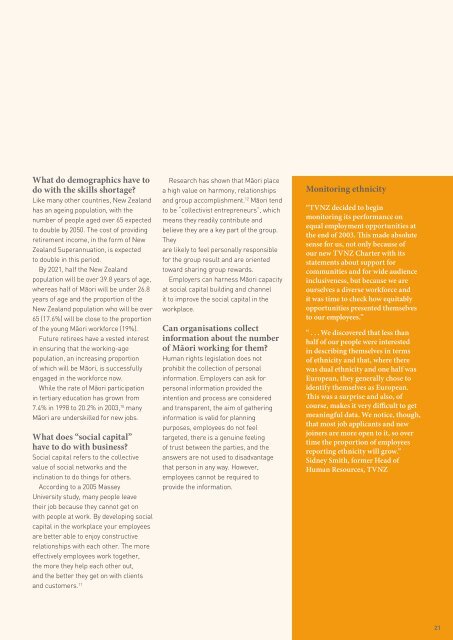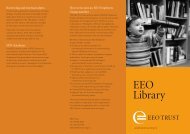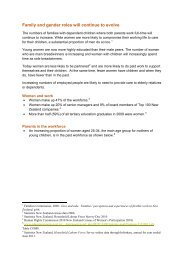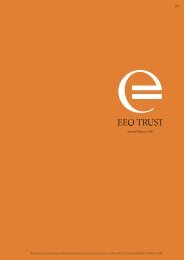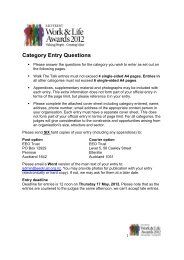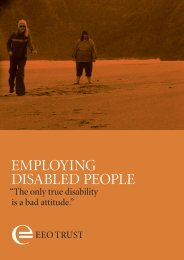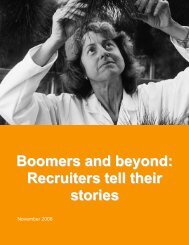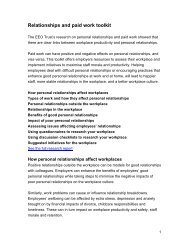Frequently asked questionsWho is a Māori?“There are no full blooded Māori left inNew Zealand so how come someone with1/24th Māori can claim to be Māori?” isthe type of question often posed to Māori.There are several ways of looking at this.On the electoral roll individuals cananswer the question “Are you a NewZealand Māori or a descendant of aNew Zealand Māori?” Their responsesindicate that a large number of peoplefeel primarily, or to an importantdegree, Māori. 7Although many Māori live away fromtheir tribal area (some estimates arethat about 20% of Māori have no tribalaffiliation) 8 many individuals feel a strongconnection to the Māori communityand cultural life.Some attributes may contribute toan individual’s sense of being Māori.For example, they may belong to a Māorigroup or network, they may be studyingor already skilled in speaking Māori,and they may have contact, regular orsporadic, with their tribal home, or theymay socialise with Māori companions.They may be on a land trust orparticipate as a whānau member.There is no grand checklist thatwhen all the boxes are ticked someonequalifies as being Māori.How come one Māori personsays to do it one way andanother says to do it differently?Not all Māori share the same culturalexperiences or understandings. Thereare also marked differences with respectto the gender and iwi affiliations andupbringing experienced by Māori.These differences are a naturalpart of a dynamic living culture.The rule of thumb is to consult andfollow the guidance of the tangatawhenua (the local Māori) of the areayou are living in.Is Pākehā a derogatory term?No. The word Pākehā was first used inthe early settlement period to describeanyone who was not Māori.While Pākehā has a variety ofmeanings, it is principally used to referto New Zealanders of British or Europeanancestry. For people several generationsremoved from their European or Britishorigins, describing themselves, or beingdescribed as, Pākehā can mean that theyidentify as part of a culture unique tothis country.The term New Zealander, which isoften suggested as an option, refers tonationality, not culture. The descendantsof early British settlers are different fromMāori, but all are New Zealanders. 9What are Māori lookingfor in a job?Research has identified that many Māoriprefer to work in environments whichsupport certain attributes.Competition is a strong motive, buttakes a social form rather than beingdriven for ego-enhancement. Māorioften compete with others to earn theirpraise, but not if this results in a declinein their relationships with colleagues.Competition between groups ispreferred to individual contests.Consultation is preferable to an“authoritarian” approach.Many Māori wish to connect workwith the rest of their lives and avoid strictcompartmentalising of work and otherroles. They aspire to congruency as aMāori across all dimensions of their life.Is the Treaty of Waitangiimportant to my business?The Treaty of Waitangi is a covenantbetween the Crown and Māori.Businesses that are not Crown entitiesare not required to include the Treatyof Waitangi in their business policiesand practices, although many do.Just as all New Zealanders areencouraged to gain an understandingof the Treaty and the intentions of thesignatories, so too are businessesencouraged to understand it.Some organisations take a positiveand proactive stance, and offer trainingon the Treaty for their employees.This creates an opportunity to betterunderstand Māori staff, customers,business partners and the widercommunity.Operating within the spirit of theTreaty is important if you are undertakinga strategic alliance with Māori, anddeveloping an understanding of theTreaty will enable better appreciationof government processes, for exampleTreaty references in the ResourceManagement Act 1991.Applying the Treaty principlesof participation, protection andpartnership can enhance therelationship all employees havewith a business.You may hear references by Māorito “Te Tiriti” – this refers to the Māori –language version with 512 signatureswhich many Māori consider to be themost legitimate document available.There are significant points ofdifference between the two versions.20
What do demographics have todo with the skills shortage?Like many other countries, New Zealandhas an ageing population, with thenumber of people aged over 65 expectedto double by 2050. The cost of providingretirement income, in the form of NewZealand Superannuation, is expectedto double in this period.By 2021, half the New Zealandpopulation will be over 39.8 years of age,whereas half of Māori will be under 26.8years of age and the proportion of theNew Zealand population who will be over65 (17.6%) will be close to the proportionof the young Māori workforce (19%).Future retirees have a vested interestin ensuring that the working-agepopulation, an increasing proportionof which will be Māori, is successfullyengaged in the workforce now.While the rate of Māori participationin tertiary education has grown from7.4% in 1998 to 20.2% in 2003, 10 manyMāori are underskilled for new jobs.What does “social capital”have to do with business?Social capital refers to the collectivevalue of social networks and theinclination to do things for others.According to a 2005 MasseyUniversity study, many people leavetheir job because they cannot get onwith people at work. By developing socialcapital in the workplace your employeesare better able to enjoy constructiverelationships with each other. The moreeffectively employees work together,the more they help each other out,and the better they get on with clientsand customers. 11Research has shown that Māori placea high value on harmony, relationshipsand group accomplishment. 12 Māori tendto be “collectivist entrepreneurs”, whichmeans they readily contribute andbelieve they are a key part of the group.Theyare likely to feel personally responsiblefor the group result and are orientedtoward sharing group rewards.Employers can harness Māori capacityat social capital building and channelit to improve the social capital in theworkplace.Can organisations collectinformation about the numberof Māori working for them?Human rights legislation does notprohibit the collection of personalinformation. Employers can ask forpersonal information provided theintention and process are consideredand transparent, the aim of gatheringinformation is valid for planningpurposes, employees do not feeltargeted, there is a genuine feelingof trust between the parties, and theanswers are not used to disadvantagethat person in any way. However,employees cannot be required toprovide the information.Monitoring ethnicity“TVNZ decided to beginmonitoring its performance onequal employment opportunities atthe end of 2003. This made absolutesense for us, not only because ofour new TVNZ Charter with itsstatements about support forcommunities and for wide audienceinclusiveness, but because we areourselves a diverse workforce andit was time to check how equitablyopportunities presented themselvesto our employees.”“ . . . We discovered that less thanhalf of our people were interestedin describing themselves in termsof ethnicity and that, where therewas dual ethnicity and one half wasEuropean, they generally chose toidentify themselves as European.This was a surprise and also, ofcourse, makes it very difficult to getmeaningful data. We notice, though,that most job applicants and newjoiners are more open to it, so overtime the proportion of employeesreporting ethnicity will grow.”Sidney Smith, former Head ofHuman Resources, TVNZ21


